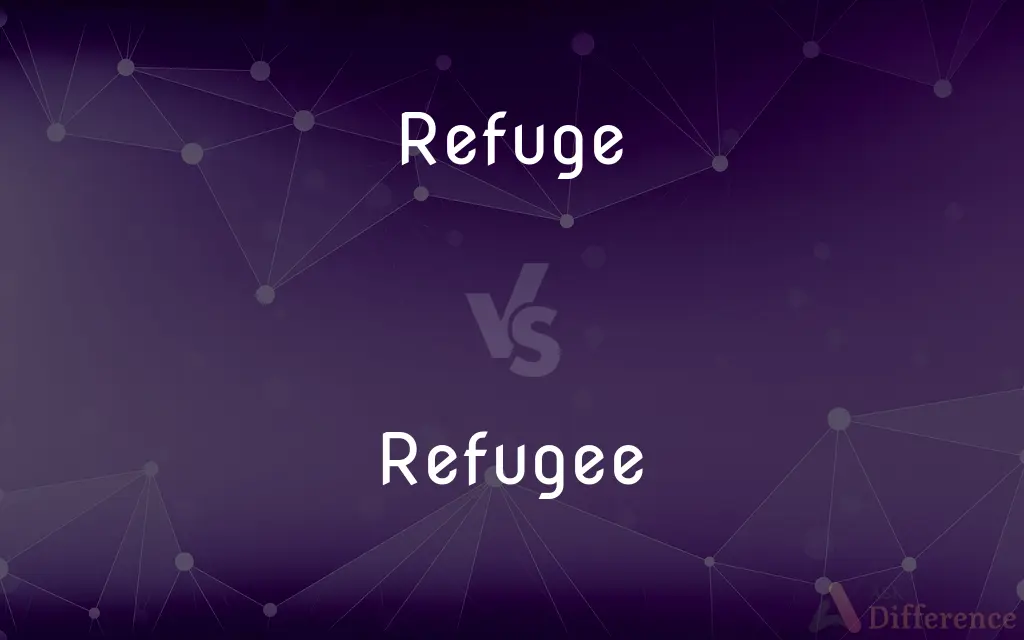Refuge vs. Refugee — What's the Difference?
By Tayyaba Rehman — Updated on October 30, 2023
Refuge is a place of safety, while a Refugee is a person fleeing danger.

Difference Between Refuge and Refugee
Table of Contents
ADVERTISEMENT
Key Differences
Refuge is derived from the Latin word "refugium," indicating a place to flee back to, whereas Refugee comes from the term "refuge" combined with the suffix "-ee," meaning someone who is the recipient or subject of the action.
Refuge commonly points to a shelter or place where one can find safety and protection, while Refugee specifically designates an individual who has been forced to flee their country due to peril or violence.
A sanctuary or haven can be described as a Refuge, whereas a Refugee is generally someone escaping persecution, war, or natural disasters.
Refuge can be physical, like a storm shelter, or metaphorical, like seeking refuge in one's faith. In contrast, a Refugee always refers to a person in a dire situation seeking safety elsewhere.
While a Refuge stands as a symbol of protection, a Refugee embodies the human aspect of displacement and the pursuit of security.
ADVERTISEMENT
Comparison Chart
Nature
A place or concept
An individual
Usage
Noun (refers to a shelter or safety)
Noun (refers to a displaced person)
Origin
Latin "refugium"
Derived from "refuge" + suffix "-ee"
Related to
Safety, shelter, protection
Displacement, fleeing, asylum-seeking
Example
"The cave provided refuge from the storm."
"The war produced thousands of refugees."
Compare with Definitions
Refuge
A protective circumstance or condition.
The ancient walls provided a refuge against invaders.
Refugee
A person forced to flee their country due to conflict or persecution.
The family became refugees after the war broke out.
Refuge
A place of shelter from danger.
The forest served as a refuge for the lost travelers.
Refugee
An individual displaced due to natural disasters.
After the earthquake, many refugees sought help.
Refuge
A retreat or escape.
The library is my refuge from the chaos of daily life.
Refugee
Someone who has been exiled from their homeland.
The political activist became a refugee after threats on his life.
Refuge
Protection or shelter, as from danger or hardship
Sought refuge from the storm in a cabin.
Refugee
A person escaping intolerable conditions.
Economic refugees are also increasing in number.
Refuge
A place providing protection or shelter
A colony that was a refuge for religious nonconformists.
Refugee
A refugee, generally speaking, is a displaced person who has crossed national boundaries and who cannot or is unwilling to return home due to well-founded fear of persecution. Such a person may be called an asylum seeker until granted refugee status by the contracting state or the United Nations High Commissioner for Refugees (UNHCR) if they formally make a claim for asylum.
Refuge
An undeveloped area for the preservation of animals and plants.
Refugee
One who flees, especially to another country, seeking refuge from war, political oppression, religious persecution, or a natural disaster.
Refuge
A source of help, relief, or comfort in times of trouble
"Reva's love was her refuge from shame and degradation" (Richard Wright).
Refugee
A person seeking refuge in a foreign country out of fear of political persecution or the prospect of such persecution in their home country, i.e., a person seeking political asylum.
Refuge
A state of safety, protection or shelter.
Refugee
A person seeking refuge due to a natural disaster, war, etc.
Refuge
A place providing safety, protection or shelter.
Refugee
A person formally granted political or economic asylum by a country other than their home country.
Refuge
Something or someone turned to for safety or assistance; a recourse or resort.
Refugee
(by extension) A person who flees one place or institution for another.
Refuge
An expedient to secure protection or defence.
Refugee
To convey (slaves) away from the advance of the federal forces.
Refuge
A refuge island.
Refugee
One who flees to a shelter, or place of safety.
Refuge
(intransitive) To return to a place of shelter.
Refugee
Especially, one who, in times of persecution or political commotion, flees to a foreign power or country for safety; as, the French refugees who left France after the revocation of the edict of Nantes.
Refuge
To shelter; to protect.
Refugee
An exile who flees for safety
Refuge
Shelter or protection from danger or distress.
Rocks, dens, and caves! But I in none of theseFind place or refuge.
We might have a strong consolation, who have fled for refuge to lay hold upon the hope set before us.
Refugee
Someone seeking safety and asylum in another country.
The country welcomed refugees from neighboring nations.
Refuge
That which shelters or protects from danger, or from distress or calamity; a stronghold which protects by its strength, or a sanctuary which secures safety by its sacredness; a place inaccessible to an enemy.
The high hills are a refuger the wild goats.
The Lord also will be a refuge for the oppressed.
Refuge
An expedient to secure protection or defense; a device or contrivance.
Their latest refugeWas to send him.
Light must be supplied, among gracefulrefuges, by terracing story in danger of darkness.
Refuge
To shelter; to protect.
Refuge
A safe place;
He ran to safety
Refuge
Something or someone turned to for assistance or security;
His only recourse was the police
Took refuge in lying
Refuge
A shelter from danger or hardship
Refuge
Act of turning to for assistance;
Have recourse to the courts
An appeal to his uncle was his last resort
Refuge
A source of help or relief.
Music became her refuge during tough times.
Refuge
A safe haven for wildlife.
The bird sanctuary is a refuge for endangered species.
Common Curiosities
How is "Refuge" used in a sentence?
"The basement was their refuge during the tornado."
What does "Refuge" mean?
"Refuge" refers to a place or state of safety.
Is "Refuge" always a physical place?
No, "Refuge" can also be metaphorical, indicating emotional or spiritual safety.
Is a "Refugee" someone who seeks refuge?
Yes, a "Refugee" is a person fleeing danger, seeking safety.
Is "Refugee" status permanent?
Not necessarily; it can be temporary until it's safe for the individual to return home or they find a permanent residence.
Can "Refuge" refer to a sanctuary for animals?
Yes, a wildlife refuge is a protected area for animals.
Can "Refugee" also refer to animals?
Typically, no. "Refugee" primarily refers to people, but in some contexts, it might be used metaphorically for animals.
What causes someone to become a "Refugee"?
Factors include war, persecution, natural disasters, or intolerable conditions.
How are refugees supported?
Various international organizations, governments, and NGOs provide aid, support, and resettlement programs for refugees.
Do all countries accept refugees?
Not all; countries have varying policies on accepting and resettling refugees.
Can "Refuge" be used in a figurative sense?
Yes, phrases like "refuge in humor" or "find refuge in memories" use the term figuratively.
What's the difference between a migrant and a refugee?
A migrant chooses to move, not necessarily due to direct threats but often for better opportunities, while a refugee is forced to flee due to danger.
Are there international laws about refugees?
Yes, the 1951 Refugee Convention outlines the rights of refugees and the obligations of states.
Can "Refuge" mean a temporary escape?
Yes, it can be a temporary escape from something stressful or harmful.
Can a place of worship be a "Refuge"?
Yes, many find spiritual and emotional refuge in places of worship.
Share Your Discovery

Previous Comparison
Coordinate vs. Facilitate
Next Comparison
Trim vs. CutAuthor Spotlight
Written by
Tayyaba RehmanTayyaba Rehman is a distinguished writer, currently serving as a primary contributor to askdifference.com. As a researcher in semantics and etymology, Tayyaba's passion for the complexity of languages and their distinctions has found a perfect home on the platform. Tayyaba delves into the intricacies of language, distinguishing between commonly confused words and phrases, thereby providing clarity for readers worldwide.














































